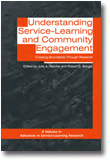
Understanding Service-Learning and Community Engagement
Crossing Boundaries through Research
Edited by:
Julie A. Hatcher, Indiana University-Purdue University Indianapolis
Robert G. Bringle, Indiana University-Purdue University Indianapolis
A volume in the series: Advances in Service-Learning Research. Editor(s): Alan S. Tinkler, Missouri State University. Todd A. Price, National Louis University.
Published 2012
There is an increasing proliferation of service-learning courses in colleges and universities in the U.S. and internationally, and research in the field has seen significant growth in diverse geographic areas in the past decade. Membership organizations now exist to convene scholars and practitioners across the globe. Chapters in this volume are based on presentations given at the 2010 annual conference of the International Association for Research on Service Learning and Community Engagement held in Indianapolis, IN. The conference theme “International Perspectives: Crossing Boundaries through Research” was chosen to highlight ways in which research crosses all kinds of boundaries: disciplinary boundaries, cultural boundaries, and national boundaries.
Although service-learning is valued as an active learning strategy across the globe, little is known about the ways that service-learning is similar or different in varied contexts. Understanding service-learning and community engagement from cross-cultural and crossdisciplinary perspectives will improve both research and practice. Together, these chapters represent the diversity, complexity, and creativity evident by scholars and practitioners in this field of study.
CONTENTS
Acknowledgments. Introduction: Exploring Similarities and Differences Through Cross-Cultural Comparative Research, Julie A. Hatcher and Robert G. Bringle. PART I: KEYNOTE ADDRESSES. Improving Rigor in Service-Learning Research, Michael Q. Patton. International Service-Learning as a Path to Global Citizenship, Barbara L. Ibrahim. PART II: CULTURAL CONTEXTS FOR RESEARCH AND PRACTICE. Center and Periphery in Service-Learning and Community Engagement: A Postcolonial Approach, Lorilee R. Sandmann, Tami L. Moore, and Jocey Quinn. Another Look at the Dissemination of the Racial Identity Interaction Model in a Cultural-Based Service-Learning Course, Lori Simons, Nancy Blank, Lawrence Fehr, Kevin Barnes, Denise Georganas, and George Manapuram. Civic Engagement In/Action: A Cross-Cultural Comparison of Youth Involvement, Elizabeth M. Goering and Crystal Henderson. Digital Classroom Project: Impact of Service-Learning and Information and Communication Technology on Student Learning in Hong Kong, Alfred C.M. Chan, Carol H.K.Ma, Sharon S.Y. Chan, Polly Y.N. Chiu, and Sandy S.S. Yeung. PART III: DISCIPLINARY CONTEXTS FOR RESEARCH AND PRACTICE. Crossing Boundaries in Service-Learning Professional Development: Preservice and Inservice Teachers Learning Together, Marjori M. Krebs. Service-Learning and the Nontraditional Student: What’s Age Got to Do With It? Helen Rosenberg, Susan Reed, Anne Statham, and Howard Rosing. A Civically Engaged Reciprocal Learning Process in Dental Education, Stuart M.Schrader, Abbe B.Shapiro, David A. Zahl, Susan L. Zunt, and Emily Deering. About the Authors.
-
Paperback978-1-61735-656-8
Web price: $39.09 (Reg. 45.99)
-
Hardcover978-1-61735-657-5
Web price: $80.74 (Reg. 94.99)
- eBook978-1-61735-658-2

- SOC035000 - SOCIAL SCIENCE: Volunteer Work
- EDU001000 - EDUCATION: ADMINISTRATION: General
- EDU037000 - EDUCATION: Research
-
 Educating Teachers and Tomorrow’s Students through Service-Learning Pedagogy
Educating Teachers and Tomorrow’s Students through Service-Learning Pedagogy
-
 Pursuit of Liberation
Critical Service-Learning as Capacity Building for Historicized, Humanizing, and Embodied Action
Pursuit of Liberation
Critical Service-Learning as Capacity Building for Historicized, Humanizing, and Embodied Action
-
 Service-Learning Pedagogy
How Does It Measure Up?
Service-Learning Pedagogy
How Does It Measure Up?
-
 Service-Learning to Advance Access & Success
Bridging Institutional and Community Capacity
Service-Learning to Advance Access & Success
Bridging Institutional and Community Capacity
-
 Service‐Learning to Advance Social Justice in a Time of Radical Inequality
Service‐Learning to Advance Social Justice in a Time of Radical Inequality
-
 Taking eService-Learning to the Next Level
Models and Tools for Next Generation Implementation
Taking eService-Learning to the Next Level
Models and Tools for Next Generation Implementation
-
 Transforming Teacher Education through Service-Learning
Transforming Teacher Education through Service-Learning

